



NFU Outlines Farm Bill, COOL Priorities
US - National Farmers Union (NFU) delegates passed three special orders of business this week, setting priorities for farm bill negotiations and maintaining its support for Country-of-Origin Labeling (COOL).NFU delegates adopted a special order of business calling for the inclusion of the Market-Driven Inventory System (MDIS) in the 2012 Farm Bill.
A study of MDIS, commissioned by NFU, found that over the next ten years, farmers and ranchers would receive a slightly higher income under MDIS compared to current policies. Under MDIS policies, the federal government would spend approximately 40 per cent of what it would if current policies were extended.
The study estimated that the current policies would cost a total of $65 billion, while MDIS policies would cost $26 billion from 2012 to 2020. The value of exports sold would also increase $15 billion dollars under MDIS policies during the period studied.
“NFU calls on Congress to enact a new federal farm bill that uses MDIS as its central component to maintain a return on the cost of production plus an opportunity for reasonable profit for farmers and ranchers,“ the statement says.
Relating to investment in the 2012 Farm Bill, a second order called for adequate funding for the US Department of Agriculture (USDA) microloan programmes, reestablishing the link between federal crop insurance eligibility and compliance with conservation requirements, and including a means of protecting farmers against catastrophic losses in the next farm bill. NFU also called for robust, mandatory funding of the Rural Energy for America programme, the Biomass Crop Assistance programme, and the Biorefinery Assistance programme.
“Agriculture is a primary driver of our rural and national economy, providing employment for one in 12 Americans, and is a job-creating industry based upon sustained production by approximately 2.2 million family farmers and ranchers,“ the order states.
“The next farm bill must be written to serve the needs of farmers and ranchers in times of need so that agriculture can continue to be a job-creating industry for all of America.“
The special order of business also urged Congress to include a strong livestock title in the 2012 Farm Bill that includes mandatory interstate shipment of meat products from state-inspected meat plants, improved food safety provisions, and the creation of the Livestock Indemnity programme and Livestock Forage programme, among other provisions.
NFU delegates also said that nutrition programmes such as Supplemental Nutrition Assistance programme should be reauthorized at 2008 levels or higher and that USDA should provide Electronic Benefit Transfer machines free of charge to all farmers markets, community-supported agriculture systems, farm stands, and other direct marketing outlets so federal nutrition programme recipients may use their benefits at healthy food locations.
In the order related to COOL, NFU calls on the office of the United States Trade Representative (USTR) to negotiate with Mexico and Canada to resolve the dispute while preserving the country-of-origin labeling law. Should that fail, the USTR must appeal the WTO decision because it is a frontal assault on US sovereignty, the transparency and integrity of our domestic markets, adversely impacts US food consumers by denying them the information they need to make informed buying decisions, denies US farmers and ranchers the opportunity to differentiate their high quality food products in their own US marketplace, and will compound the problems of a negative balance of trade deficit.
“NFU has been an outspoken proponent for COOL from the very beginning,“ said NFU President Roger Johnson. “The delegates were passionate about this issue and will refuse to accept the WTO’s recent decision without a fair fight. We are proud of the work U.S. farmers and ranchers do to provide an abundant and high quality food supply. We urge the USTR to take action that will allow us to label food so that we can meet the demands of our customers.“
The special orders are considered in advance of the rest of the organization’s policy, indicating the issues that are of utmost importance for the coming year.








